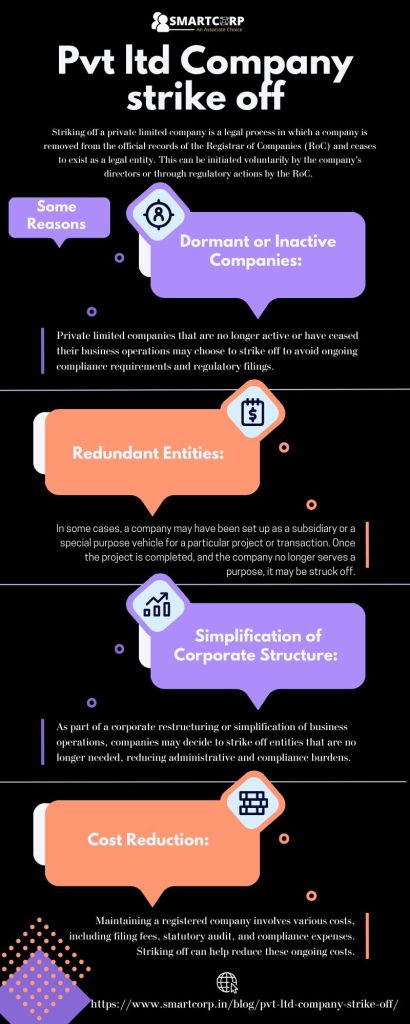
Pvt ltd Company strike off
A Private Limited Company (Pvt Ltd) is a legal business entity where ownership is restricted to a limited number of shareholders. It offers limited liability protection, ensuring that shareholders are liable for the company’s debts only to the extent of their shareholding. Striking off a private limited company is a legal process in which a company is removed from the official records of the Registrar of Companies (RoC) and ceases to exist as a legal entity. This can be initiated voluntarily by the company’s directors or through regulatory actions by the RoC. In this blog, we will explore the reasons for striking off a private limited company, the process involved, and the implications for stakeholders.
Reasons for Striking Off a Private Limited Company:
There are several reasons why a company with private limited company registration in Bangalore may consider striking off. These reasons typically fall into two categories: voluntary striking off and regulatory striking off.
Voluntary Striking Off:
Dormant or Inactive Companies:
Private limited companies that are no longer active or have ceased their business operations may choose to strike off to avoid ongoing compliance requirements and regulatory filings. This is common when a company has served its purpose or is no longer economically viable.
Redundant Entities:
In some cases, a company may have been set up as a subsidiary or a special purpose vehicle for a particular project or transaction. Once the project is completed, and the company no longer serves a purpose, it may be struck off.
Simplification of Corporate Structure:
As part of a corporate restructuring or simplification of business operations, companies may decide to strike off entities that are no longer needed, reducing administrative and compliance burdens.
Cost Reduction:
Maintaining a registered company involves various costs, including filing fees, statutory audit, and compliance expenses. Striking off can help reduce these ongoing costs.
Regulatory Striking Off:
Non-Compliance:
If a pvt ltd company with private limited company registration in Bangalore fails to meet its statutory obligations, such as annual filing of financial statements and annual returns with the RoC, it can be subject to regulatory striking off. Non-compliance may also include failing to maintain a registered office address, conduct statutory meetings, or keep proper accounting records.
Default in Statutory Filings: If a private limited company defaults in filing its financial statements and annual returns for consecutive years, the RoC may initiate the process to strike off the company.
Fraudulent Activities: If a company is found to be engaged in fraudulent activities or is operating against the interests of its stakeholders, regulators may take action to strike off the company.
Process of Striking Off a Private Limited Company:
The process of striking off a pvt ltd company with private limited company registration in Bangalore involves several steps, and it can vary slightly based on the circumstances, whether it is voluntary or regulatory striking off.
An overview of the typical steps involved:
Board Resolution:
For voluntary striking off, the company’s board of directors must pass a resolution approving the decision to strike off the company. The resolution should also specify the reasons for striking off. In cases of regulatory striking off, the RoC initiates the process, and the company is typically notified.
Outstanding Compliance: The Company must ensure that all outstanding compliance requirements are met. This includes filing annual financial statements, annual returns, and other statutory documents. The RoC may reject the application for striking off if there are pending compliance issues.
Notice to Creditors and Shareholders:
The company must inform its creditors, debenture holders, and shareholders about the proposed striking off. Any objections from these stakeholders should be resolved before proceeding.
Application for Striking Off:
The company with private limited company registration in Bangalore is required to file an application with the RoC for striking off. The application must be accompanied by the necessary documents, including the board resolution, audited financial statements, and a statement of accounts.

Public Notice:
The RoC publishes a public notice in the Official Gazette to inform the public about the company’s striking off. This is to allow any interested parties to raise objections within a specified timeframe.
Objections Handling:
If there are objections from creditors, shareholders, or other stakeholders, the RoC will consider them before making a decision. The company may need to address these objections to proceed with the striking off process.
Striking Off Order:
If there are no objections or the RoC is satisfied that all objections have been addressed, a striking off order is issued. The company is officially struck off the register.
Dissolution:
Once the striking off order is issued, the company is dissolved, and it ceases to exist as a legal entity. Its assets, if any, are deemed ownerless and vest with the government.
Implications of Striking Off:
Striking off a private limited company with private limited company registration in Bangalore has several implications for the company and its stakeholders:
Legal Entity Status:
The company ceases to exist as a legal entity, and its name is removed from the RoC’s records.
Directors’ Liabilities:
The directors of the company may continue to be liable for any pre-existing debts and liabilities unless specific legal protections apply. Directors should ensure that all liabilities are settled before striking off.
Transfer of Assets:
Any remaining assets of the company are considered ownerless and may vest with the government.
Revival:
In some cases, if the striking off was initiated by regulatory authorities, the company may be revived if the reasons for striking off are resolved. However, the revival process can be complex and involve court intervention.
Impact on Creditors and Shareholders:
Creditors may find it challenging to recover outstanding debts from a struck-off company, and shareholders lose their ownership and rights in the company.
Repercussions on Directors:
Directors of a company which has received strike-off may face disqualification from serving as directors of other companies for a specified period if the striking off was due to non-compliance.
Conclusion:
Striking off a private limited company with private limited company registration in Bangalore is a significant decision that can be initiated voluntarily or through regulatory actions. It is often considered when a company is no longer active, has fulfilled its purpose, or is facing non-compliance issues.
The process involves various steps, including obtaining board approval, addressing compliance requirements, notifying stakeholders, and filing an application with the RoC. Once the striking off order is issued, the company ceases to exist as a legal entity, and its assets may vest with the government.
Directors may remain liable for pre-existing debts, and shareholders lose their ownership rights. It is essential to carefully consider the implications and legal obligations before proceeding with the striking off process and, if necessary, seek professional advice to navigate the complexities of company dissolution.

